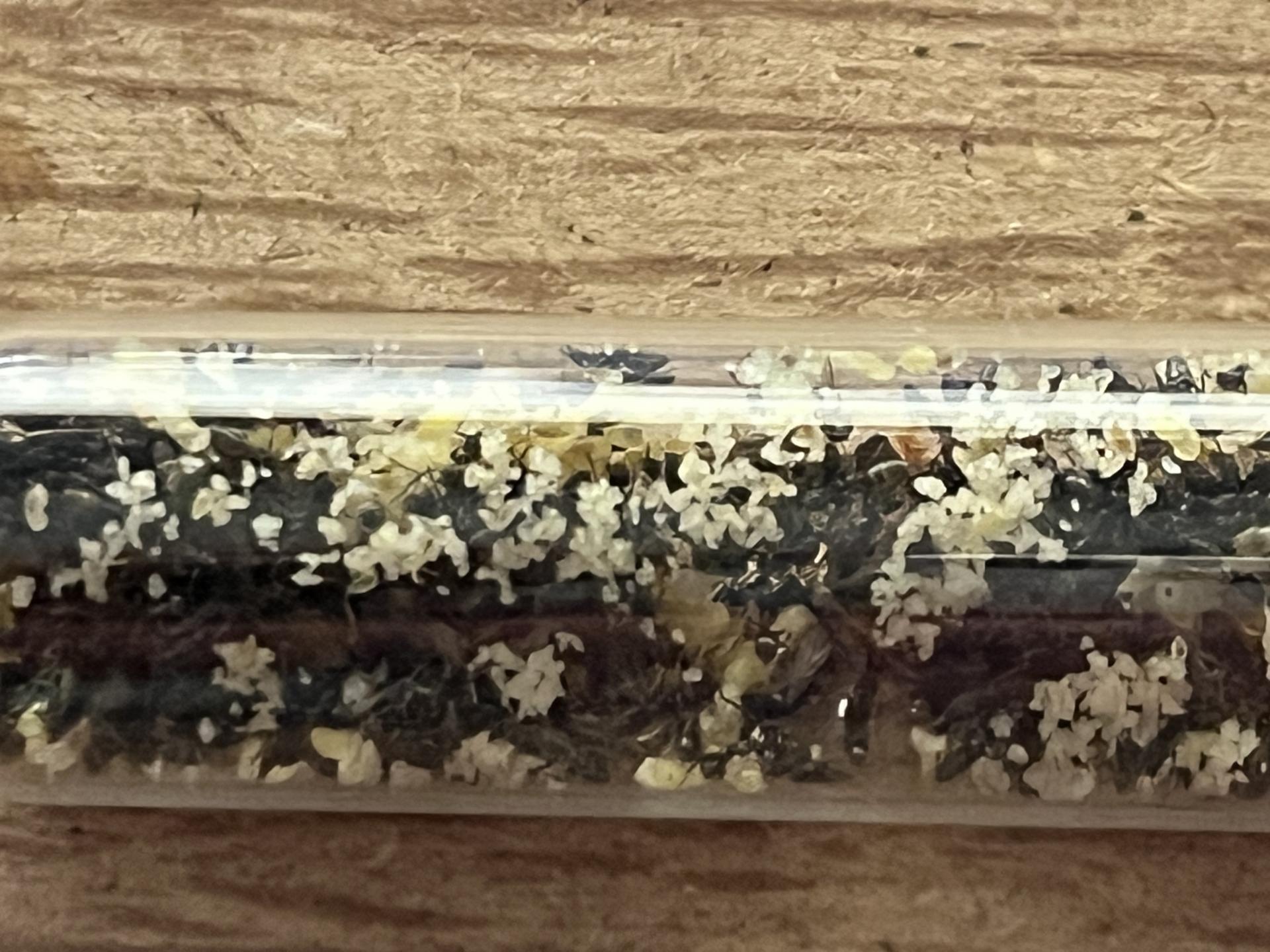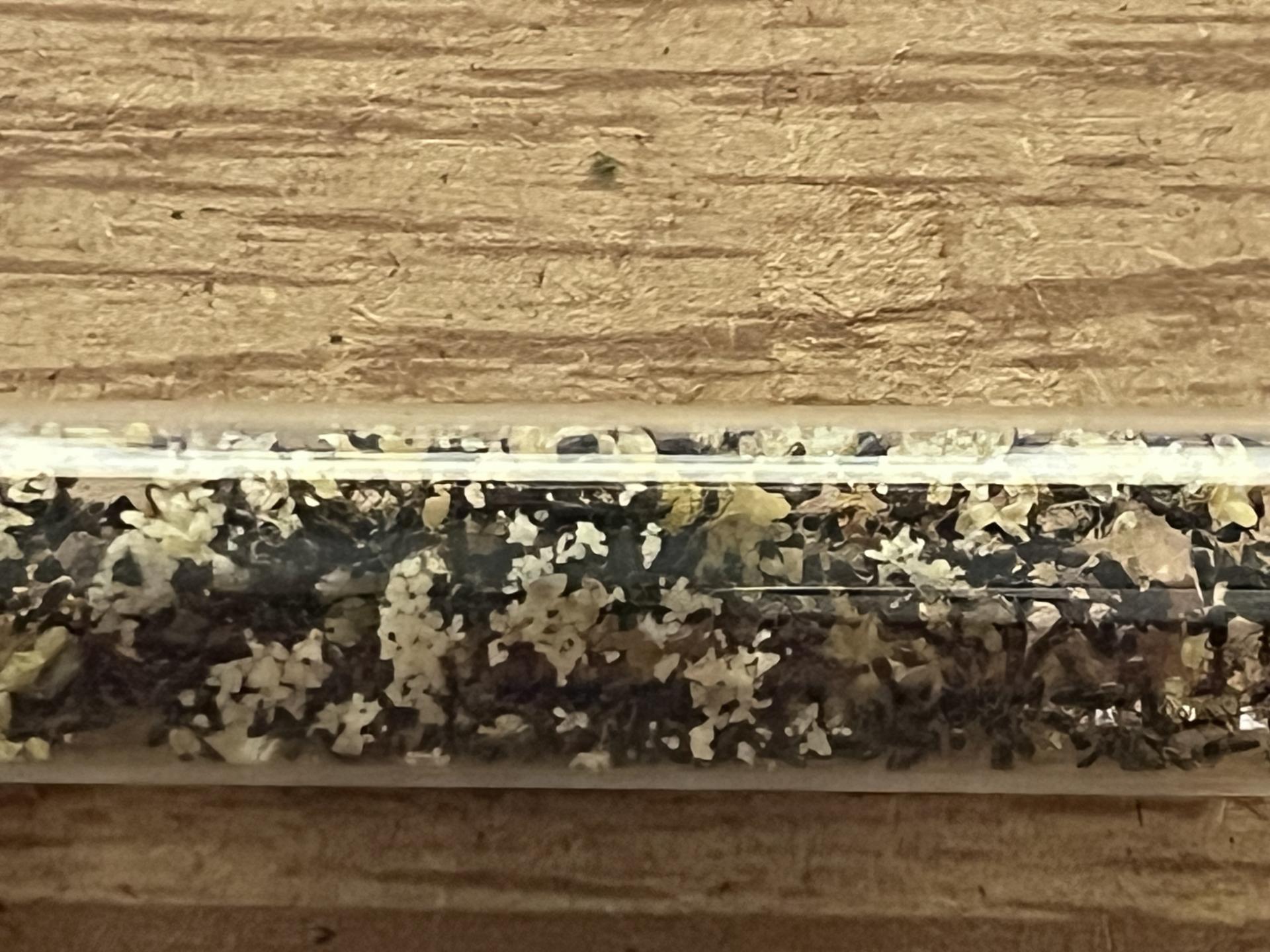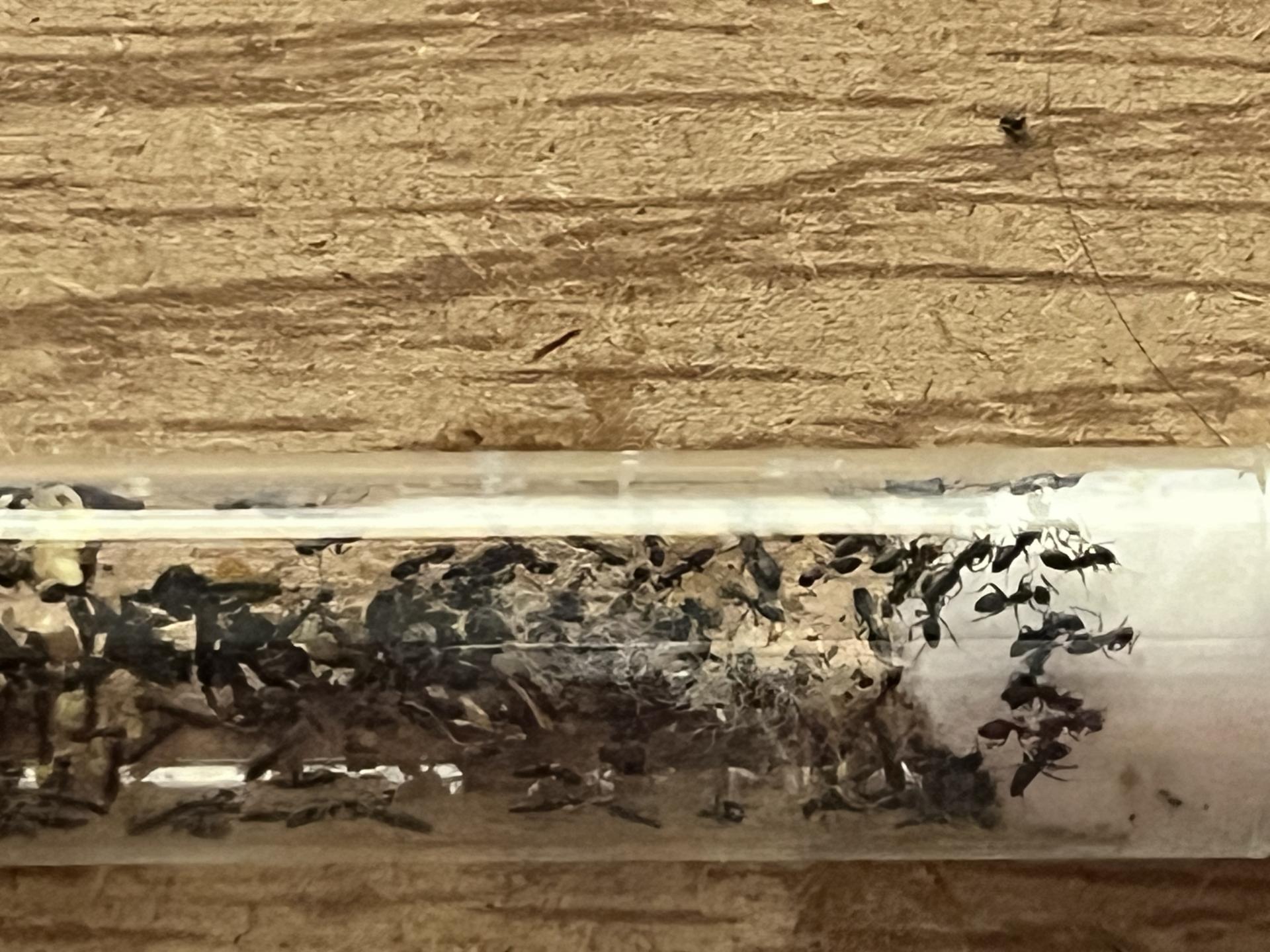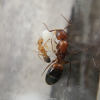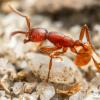- Formiculture.com
- Forums
- Gallery
- Members
- Member Map
- Chat
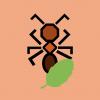
12 replies to this topic
#1
 Offline
-
Posted March 22 2024 - 2:46 PM
Offline
-
Posted March 22 2024 - 2:46 PM
So a friend who lives nearby said that they found some small little ants living (more like hibernating) in their flowerpots. They caught them and told me after. So I went to their house, and boy was I surprised. I knew they were talking about a big colony cause flowerpots means outside and the animals are wild, and wild colonies usually means big colonies. So yeah, I went and collected the colony in a test tube which I ID’d there, and went back home. They currently have about 6 or more queens, and at least 300 - 500 total workers (and medians or majors if they are polygynous which is what I’m suspecting since I see some in different sizes). Anyways, this is my first time keeping a wild super colony, and this is also my first time I’m actually keeping this species, so any suggestions would be very much appreciated (these guys have to move ASAP, so any suggestions on their setups would also greatly be appreciated). Images are blurry; but you can see their triangular like heads and long slim, pointed like body.
- futurebird and rptraut like this
Keeping:
3x - S. molesta (colonies and single queen) 1x - C. nearcticus (founding but no eggs) ![]() New!
New!
1x - C. chromaiodes (colony) 1x - C. subbarbatus (founding)
1x - F. subsericea (founding) 1x - T. sessile (mega colony)
3x - P. imparis (colonies)
2x - L. neoniger (founding)
Check out my C. nearcticus journal here: https://www.formicul...cticus-journal/
Check out my C. chromaiodes journal here: https://www.formicul...aiodes-journal/
#2
 Offline
-
Posted March 23 2024 - 8:03 AM
Offline
-
Posted March 23 2024 - 8:03 AM
Oh yeah, and I forgot to mention that these guys have all male alates.
Keeping:
3x - S. molesta (colonies and single queen) 1x - C. nearcticus (founding but no eggs) ![]() New!
New!
1x - C. chromaiodes (colony) 1x - C. subbarbatus (founding)
1x - F. subsericea (founding) 1x - T. sessile (mega colony)
3x - P. imparis (colonies)
2x - L. neoniger (founding)
Check out my C. nearcticus journal here: https://www.formicul...cticus-journal/
Check out my C. chromaiodes journal here: https://www.formicul...aiodes-journal/
#3
 Offline
-
Posted March 23 2024 - 11:12 AM
Offline
-
Posted March 23 2024 - 11:12 AM
Don’t let them take over your kitchen.
- futurebird, bmb1bee and Artisan_Ants like this
"The ants are a people not strong, yet they prepare their meat in the summer." Prov. 30:25
Keep ordinary ants in extraordinary ways.
Keep ordinary ants in extraordinary ways.
#4
 Offline
-
Posted March 23 2024 - 1:55 PM
Offline
-
Posted March 23 2024 - 1:55 PM
Do you have any tar heel ants nests? I've kept this species as well as their tropical cousin tapinoma melanocephalum in mini hearths without issues.
- Artisan_Ants likes this
My journals:
Polyergus Mexicanus: https://www.formicul...gs/#entry175528
Lasius minutus: https://www.formicul...cs/#entry174811
Lasius latipes: https://www.formicul...gs/#entry206449
General acanthomyops journal: https://www.formicul...yops-with-eggs/
Polyergus Mexicanus: https://www.formicul...gs/#entry175528
Lasius minutus: https://www.formicul...cs/#entry174811
Lasius latipes: https://www.formicul...gs/#entry206449
General acanthomyops journal: https://www.formicul...yops-with-eggs/
#5
 Offline
-
Posted March 23 2024 - 11:57 PM
Offline
-
Posted March 23 2024 - 11:57 PM
Hello Artisan Ants;
Congratulations on finding one of my favourite ants to keep. I’ve encouraged others, especially beginners, to keep these ants because they are easy to find, easy to contain, and they’ll eat a wide variety of foods. They also have multiple queens for initial growth and sustainability of the colony.
I’ve found Tapinoma sessile colonies living in flower pots, hollow tomato stems, an aluminum tent pole, a hollow rhubarb stem, and yes, I’ve also found them in my kitchen eating dog food from my pet’s dish. I was able to lure an entire colony into an “Uncle Milton” ant farm by simply setting up a sugar/water feeding station in the farm where I also fed chicken and dog food. They moved right in! They’re very adaptable to many styles of housing, but they seem to prefer a relatively dry nest. Check out my post titled “Big Rock Keeps This Colony Warm” on page 40 of the Formicariums and Outworlds thread. These ants really like heat for their pupae.
I feed my colonies mostly meat products like chicken, turkey, raw pork, liver, dog food, and the occasional insect treat. I also give them sugar/water and water.
The really great thing about keeping these ants is that they are so easy to contain. I use heavy mineral oil in a narrow band at the bottom of walls and a narrow band of Vaseline at the top for insurance. The Vaseline probably isn’t necessary because they stop instantly when they touch the mineral oil. I feel so confident about their containment that they’re one of the few ants I keep in an open-top container. I keep them in test tube nests, grout nests, and an Uncle Milton ant farm. They live happily in my diy setups. They’re very flexible and never seem determined to escape.
All of my colonies have multiple queens, but so far, none of them have gotten excessively large. In spring I often connect a small founding formicarium to a large colony for any queens who want to split off into another colony. This has happened twice. Two of my colonies have had nuptial flights.
Another nice aspect of these ants is that they do a lot of foraging in the outworld, so there’s always something going on and they’re very entertaining. They don’t seem to mind feeding in the open and many ants feed at one time, again very entertaining.
Please excuse the poor quality of this post, no italics, no link, and no photos. I’m not home right now, writing this on my iPad, but when I get back I’ll post some photos. I’m happy to answer any other questions you may have.
RPT
Congratulations on finding one of my favourite ants to keep. I’ve encouraged others, especially beginners, to keep these ants because they are easy to find, easy to contain, and they’ll eat a wide variety of foods. They also have multiple queens for initial growth and sustainability of the colony.
I’ve found Tapinoma sessile colonies living in flower pots, hollow tomato stems, an aluminum tent pole, a hollow rhubarb stem, and yes, I’ve also found them in my kitchen eating dog food from my pet’s dish. I was able to lure an entire colony into an “Uncle Milton” ant farm by simply setting up a sugar/water feeding station in the farm where I also fed chicken and dog food. They moved right in! They’re very adaptable to many styles of housing, but they seem to prefer a relatively dry nest. Check out my post titled “Big Rock Keeps This Colony Warm” on page 40 of the Formicariums and Outworlds thread. These ants really like heat for their pupae.
I feed my colonies mostly meat products like chicken, turkey, raw pork, liver, dog food, and the occasional insect treat. I also give them sugar/water and water.
The really great thing about keeping these ants is that they are so easy to contain. I use heavy mineral oil in a narrow band at the bottom of walls and a narrow band of Vaseline at the top for insurance. The Vaseline probably isn’t necessary because they stop instantly when they touch the mineral oil. I feel so confident about their containment that they’re one of the few ants I keep in an open-top container. I keep them in test tube nests, grout nests, and an Uncle Milton ant farm. They live happily in my diy setups. They’re very flexible and never seem determined to escape.
All of my colonies have multiple queens, but so far, none of them have gotten excessively large. In spring I often connect a small founding formicarium to a large colony for any queens who want to split off into another colony. This has happened twice. Two of my colonies have had nuptial flights.
Another nice aspect of these ants is that they do a lot of foraging in the outworld, so there’s always something going on and they’re very entertaining. They don’t seem to mind feeding in the open and many ants feed at one time, again very entertaining.
Please excuse the poor quality of this post, no italics, no link, and no photos. I’m not home right now, writing this on my iPad, but when I get back I’ll post some photos. I’m happy to answer any other questions you may have.
RPT
- futurebird, Ernteameise, Artisan_Ants and 1 other like this
My father always said I had ants in my pants.
#6
 Offline
-
Posted March 24 2024 - 1:05 AM
Offline
-
Posted March 24 2024 - 1:05 AM
This is really super cool to see such a large colony collected at once!
I hope to see more of this colony, especially once you get them in a nest!
Also, as a side note, I believe you may have been meaning polymorphic when mentioning the ants sizes, not polygynous.
Anyway, keep us posted! It's a beautiful colony
I hope to see more of this colony, especially once you get them in a nest!
Also, as a side note, I believe you may have been meaning polymorphic when mentioning the ants sizes, not polygynous.
Anyway, keep us posted! It's a beautiful colony
- rptraut and Artisan_Ants like this
#7
 Offline
-
Posted March 24 2024 - 3:24 AM
Offline
-
Posted March 24 2024 - 3:24 AM
I propose April 1st as National Tapinoma sessile Appreciation Day.
- rptraut and Artisan_Ants like this
"The ants are a people not strong, yet they prepare their meat in the summer." Prov. 30:25
Keep ordinary ants in extraordinary ways.
Keep ordinary ants in extraordinary ways.
#8
 Offline
-
Posted March 24 2024 - 4:30 AM
Offline
-
Posted March 24 2024 - 4:30 AM
Thank you all for the great information. So for the time being, I have put the in a tube and
Tubes setup, as I have moved my P. imparis colony into my Birfircated mini hearth (but they are only about 30 workers strong so maybe it’s too small?) what I’m thinking is that I’ll keep this colony in a tubes and tubes set up until I can get a Bifircated mini hearth. I’ll post images of them soon. Other than that, thank you all once again for the advice! Just thought that I might just add this in, she do these guys fly as they are stacked with males (whenever I check on them to see they’re moving progress, they start to swarm and males go everywhere around the container; thankfully not in my home). Yesterday they seemed to want to fly but it was pouring outside and very windy and cold.
Tubes setup, as I have moved my P. imparis colony into my Birfircated mini hearth (but they are only about 30 workers strong so maybe it’s too small?) what I’m thinking is that I’ll keep this colony in a tubes and tubes set up until I can get a Bifircated mini hearth. I’ll post images of them soon. Other than that, thank you all once again for the advice! Just thought that I might just add this in, she do these guys fly as they are stacked with males (whenever I check on them to see they’re moving progress, they start to swarm and males go everywhere around the container; thankfully not in my home). Yesterday they seemed to want to fly but it was pouring outside and very windy and cold.
- rptraut likes this
Keeping:
3x - S. molesta (colonies and single queen) 1x - C. nearcticus (founding but no eggs) ![]() New!
New!
1x - C. chromaiodes (colony) 1x - C. subbarbatus (founding)
1x - F. subsericea (founding) 1x - T. sessile (mega colony)
3x - P. imparis (colonies)
2x - L. neoniger (founding)
Check out my C. nearcticus journal here: https://www.formicul...cticus-journal/
Check out my C. chromaiodes journal here: https://www.formicul...aiodes-journal/
#9
 Offline
-
Posted March 24 2024 - 6:58 PM
Offline
-
Posted March 24 2024 - 6:58 PM
Good luck! I have a colony going and just give them 1:2 honey/water and Dubai roaches and they are good to go. I keep my in tubes set in trays lined with fluon with dried leaves thrown in and they seem to be "happy" if that word may be applied to ants.
- rptraut and Artisan_Ants like this
#10
 Offline
-
Posted March 24 2024 - 10:01 PM
Offline
-
Posted March 24 2024 - 10:01 PM
Hello Artisan Ants;
Glad to hear that our advice is helpful. Tubs and tubes is a good system to start off with. I use essentially the same system, but I stack the tubes, one on top of the other and then I put the big rock against them to hold them against the acrylic wall - I call it the “Tubes and Cubes” system. They seem to prefer this to a grout nest, although they live quite “happily” there too.
With respect to alates, are you sure they’re males? Tapinoma queens are considerably smaller than something like a Lasius queen, maybe 1/3 the size. I can’t see them in your photos to be able to tell, they have the larger gaster, like other queen ants, which the males don’t have.
I dealt with your alate situation a couple of ways. When I first saw alates frantically running around, it appeared to me that the workers were herding them up and forcing them out of the nest. I didn’t want to figure out how to let them fly outside, so I sucked up as many of them as I could with my pooter and disposed of them in the freezer. It took a couple of days to get them all. With them gone, the colony settled back down to the business of raising brood.
I released alates outside in two ways. First, alates like to climb high and then launch into the air. I used an extra long coffee stir stick stuck in a wad of modelling clay, and placed it vertically, or straight up, so the alates could climb up it and fly but the workers couldn’t escape. With one colony I simply placed them near an open window, darkened the room as much as I could, and they flew towards the light and out the window. With a second colony I took them outside, used the same stir stick technique and away they went. I worried about workers escaping, but it seemed they were so intent on evicting every last alate from the nest that it was a non-issue.
Hope this helps, let us know how you make out.
RPT
Glad to hear that our advice is helpful. Tubs and tubes is a good system to start off with. I use essentially the same system, but I stack the tubes, one on top of the other and then I put the big rock against them to hold them against the acrylic wall - I call it the “Tubes and Cubes” system. They seem to prefer this to a grout nest, although they live quite “happily” there too.
With respect to alates, are you sure they’re males? Tapinoma queens are considerably smaller than something like a Lasius queen, maybe 1/3 the size. I can’t see them in your photos to be able to tell, they have the larger gaster, like other queen ants, which the males don’t have.
I dealt with your alate situation a couple of ways. When I first saw alates frantically running around, it appeared to me that the workers were herding them up and forcing them out of the nest. I didn’t want to figure out how to let them fly outside, so I sucked up as many of them as I could with my pooter and disposed of them in the freezer. It took a couple of days to get them all. With them gone, the colony settled back down to the business of raising brood.
I released alates outside in two ways. First, alates like to climb high and then launch into the air. I used an extra long coffee stir stick stuck in a wad of modelling clay, and placed it vertically, or straight up, so the alates could climb up it and fly but the workers couldn’t escape. With one colony I simply placed them near an open window, darkened the room as much as I could, and they flew towards the light and out the window. With a second colony I took them outside, used the same stir stick technique and away they went. I worried about workers escaping, but it seemed they were so intent on evicting every last alate from the nest that it was a non-issue.
Hope this helps, let us know how you make out.
RPT
- Artisan_Ants and AntsGodzilla like this
My father always said I had ants in my pants.
#11
 Offline
-
Posted March 25 2024 - 6:54 AM
Offline
-
Posted March 25 2024 - 6:54 AM
Thank you rptraut for the alate information. Greatly helps. Do you know when I should release them? On nuptial flight charts it says that this species fly in April. Might as well release them today since fairly hot outside. I will definitely use your technique for the alates. And about them; they are all males as they are much more smaller than the queen. Also much more slender. There are all more surplus amounts which makes sense due to how many eggs a queen can lay in a mature colony (especially for polygynous species like this one). I spot at least one queen here and there to check on their progress moving in their old test tube.
- rptraut likes this
Keeping:
3x - S. molesta (colonies and single queen) 1x - C. nearcticus (founding but no eggs) ![]() New!
New!
1x - C. chromaiodes (colony) 1x - C. subbarbatus (founding)
1x - F. subsericea (founding) 1x - T. sessile (mega colony)
3x - P. imparis (colonies)
2x - L. neoniger (founding)
Check out my C. nearcticus journal here: https://www.formicul...cticus-journal/
Check out my C. chromaiodes journal here: https://www.formicul...aiodes-journal/
#12
 Offline
-
Posted March 26 2024 - 8:54 AM
Offline
-
Posted March 26 2024 - 8:54 AM
Hello Artisan Ants;
When alates are running around outside the nest because the workers are forcing them out, I think it’s time to deal with them. If all of them are males, I would use the pooter and freeze method. It’s much easier than live release and you may have to do it a couple of days in a row to catch them all outside the nest. With one of my colonies, it took three afternoons in a row of taking them outside before all of the alates had flown. Kind of a pain. Freezing is certainly easier and might even be more environmentally responsible.
RPT
When alates are running around outside the nest because the workers are forcing them out, I think it’s time to deal with them. If all of them are males, I would use the pooter and freeze method. It’s much easier than live release and you may have to do it a couple of days in a row to catch them all outside the nest. With one of my colonies, it took three afternoons in a row of taking them outside before all of the alates had flown. Kind of a pain. Freezing is certainly easier and might even be more environmentally responsible.
RPT
- Artisan_Ants and AntsGodzilla like this
My father always said I had ants in my pants.
#13
 Offline
-
Posted March 26 2024 - 10:05 AM
Offline
-
Posted March 26 2024 - 10:05 AM
Thank you rptraut once again. I will use this method like you said. In the works of moving them outside to fly yesterday, they moved into the new test tube due to the light, but then about 1/5 moved back. Probably due to the lack of space (they can barely even fit in one tube as seen in the pics).Hello Artisan Ants;
When alates are running around outside the nest because the workers are forcing them out, I think it’s time to deal with them. If all of them are males, I would use the pooter and freeze method. It’s much easier than live release and you may have to do it a couple of days in a row to catch them all outside the nest. With one of my colonies, it took three afternoons in a row of taking them outside before all of the alates had flown. Kind of a pain. Freezing is certainly easier and might even be more environmentally responsible.
RPT
- rptraut likes this
Keeping:
3x - S. molesta (colonies and single queen) 1x - C. nearcticus (founding but no eggs) ![]() New!
New!
1x - C. chromaiodes (colony) 1x - C. subbarbatus (founding)
1x - F. subsericea (founding) 1x - T. sessile (mega colony)
3x - P. imparis (colonies)
2x - L. neoniger (founding)
Check out my C. nearcticus journal here: https://www.formicul...cticus-journal/
Check out my C. chromaiodes journal here: https://www.formicul...aiodes-journal/
Also tagged with one or more of these keywords: odorous house ants, tapinoma, queens, workers, males, alates, brood
 |
Anting →
General Anting →
Canadian Ant Watch ThreadStarted by OwlThatLikesAnts , Mar 12 2025 |
|

|
|
Anting →
General Anting →
Catching Alates in AZ SpringtimeStarted by Ants4ever7 , Feb 20 2025 |
|

|
||
Ants & Myrmecology →
General →
Odontomachus Clarus Eating Brood!Started by LieutenAnt_Dan , Oct 1 2024 |
|

|
||
 |
Anting →
General Anting →
Conditions for Desert Flights: A look into thunderstormsStarted by UtahAnts , Aug 4 2024 |
|

|
|
Ant Keeping →
General Ant Keeping →
How long does it take for pupae to turn into workers?Started by cooIboyJ , Jul 25 2024 |
|
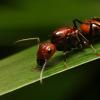
|
1 user(s) are reading this topic
0 members, 1 guests, 0 anonymous users




